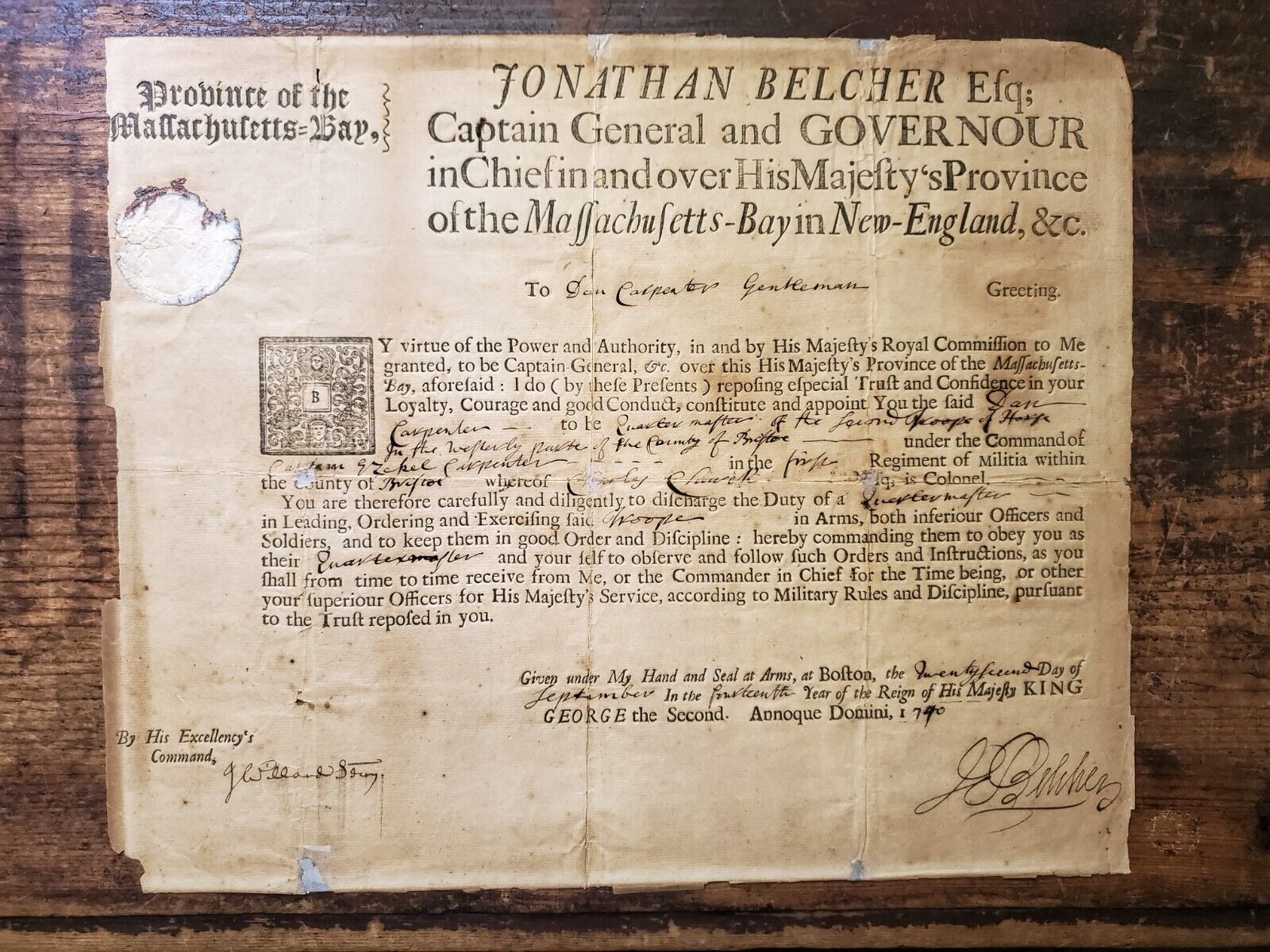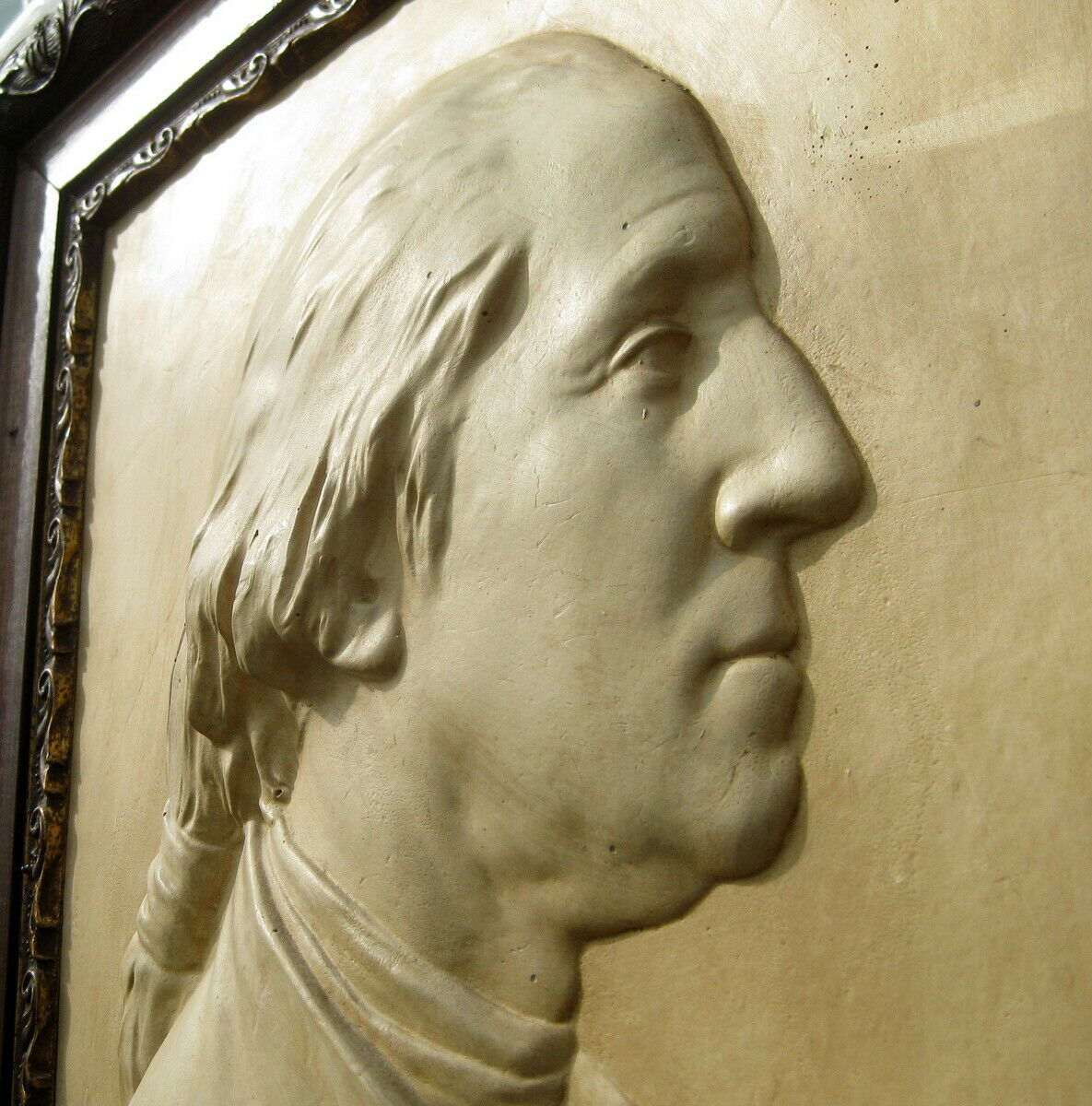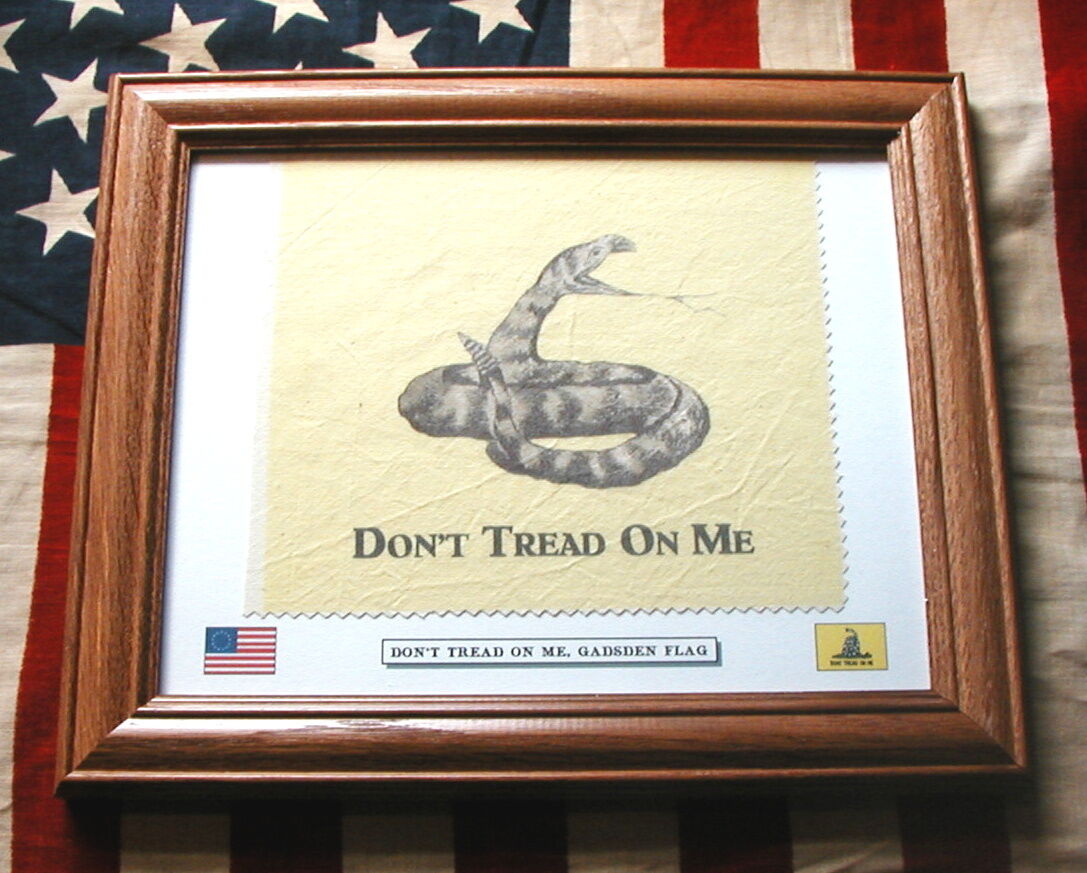-40%
1740 Mass Military appointment for Daniel Carpenter sgd. by Gov Jonathan Belcher
$ 396
- Description
- Size Guide
Description
1740 Massachusetts Military appointment for Daniel Carpenter signed by Gov. Jonathan BelcherDescription:
Pre Revolutionary Colonial Massachusetts Cavalry commission signed by Jonathan Belcher Esq; "Captain-General and Governour in Chief, in and over His Majesty's Province of the Massachusetts-Bay in New-England, &c.” Partially printed document dated September 22 , 1740 appointing Dan Carpenter to be Quartermaster of the Second Troop of Horse in Bristol County, First Regiment of Militia.
Signed "J. Belcher" at the bottom right, fully intact, embossed paper over the wax seal of Massachusetts. It is further signed by "J.Willard” , Secretary, at the bottom.
Size: 16 1/2" x 10"
Condition:
In Very good condition "as is" with the typical expected folding lines, some wear and paper losses with partial separations and some losses along the edges. On the back there are archival tapes placed for preserving and protecting the folding line separations.
Overall, a fine military commission in good condition for its age.
*Military Commissions were very personal documents, they were carried folded, by the officer like an identification.
Biography:
Jonathan Belcher (July 23, 1710 – March 30, 1776)
Jonathan Belcher was the colonial governor of Massachusetts and New Hampshire from 1730-1741 and later governor of New Jersey from 1746 until the year of his death, 1757. In addition to serving these terms of office, Governor Belcher also founded the college now known as Princeton University. His goal was to promote knowledge of both good government and Christianity.
Jonathan Belcher had a definite view of government that was shared by many of his contemporaries and indeed, by Christians of all ages. Governor Belcher's views of government also provide an insight into the mind of Early America. His philosophy of government was: That a "good ruler" must serve as the father of his people and care for their welfare as much as a father cares for the well-being of his own child. This, of course, meant practicing Jesus' principle that we treat other people just as we would like to be treated ourselves.
A compassionate man, Jonathan Belcher often helped and befriended the powerless in his governments. He was a "terror to evil doers", but to those who lived righteously, he was a firm and faithful friend. These qualities of the governor were extolled in the very first biography ever written about him by his friend Aaron Burr, Sr. (1715/16-1757), then president of Princeton college.
Jonathan Belcher remained honest throughout his two tenures as governor and indeed, throughout his entire life. He highly valued truth and morality. He also valued fairness, justice for all (regardless of social status), and impartiality. Numerous instances abound in his still-extant letters urging other government officials to practice fairness in certain cases, or fairness in general. For instance, he favored changing the inheritance laws of that day so that women, as well as men, could inherit property--a viewpoint that was rare in his time. When he was governor of Massachusetts and New Hampshire, he prevented a lieutenant governor from illegally flogging some harassed colonists in violation of their civil rights. By discouraging this ruthless action, Governor Belcher protected the persecuted common people and championed their right to personal safety and freedom.
When Jonathan Belcher was governor of New Jersey, he opposed that colony's rich aristocrats who tried to wrest property away from the common people through the use of an "elite" Board of Proprietors that initiated lawsuits and circumvented jury verdicts in favor of the landed gentry. Prior to the coming of Jonathan Belcher as governor, a series of land title disputes resulted in land riots when the common people were ejected from property to which they, as well as the proprietors, had a disputed title. Though Governor Belcher was not in favor of the riots, he sympathized with the common people; he disapproved of the proprietors' attempts to trample on the people's civil liberties, and he tried to resolve the dispute through the use of legal means. Furthermore, Governor Belcher was in favor of religious liberty for all, regardless of denomination--including Quakers (who were often discriminated against by others). In these instances, Governor Belcher's viewpoints foreshadowed the rallying cry of the American Revolution for liberty and equality. In that sense, Jonathan Belcher was a true American patriot.
He was a patriot in another sense, also, when he diligently supported the American militia not only in Massachusetts and New Hampshire, but also during the French and Indian War of the 1750s. This was the last major war before the American Revolution. Governor Belcher urged governors of other colonies to pay their soldiers' salaries fully and promptly, and to give them their back pay. A strong supporter of the local American militia, Jonathan Belcher was one of those who wanted the American colonies to unite against their common foe. In that, Governor Belcher's call anticipated the uniting of the American colonies during the American Revolution.
Unlike most royal colonial governors, Jonathan Belcher was not British: He was American. Born in Cambridge, Massachusetts, a third-generation descendant of an early settler of the Massachusetts colony (Andrew Belcher), Jonathan Belcher was American through and through.
"The scholar, the accomplished gentleman, and the true Christian, were seldom ever more happily and thoroughly united, than in him...."
--- President Aaron Burr of Princeton College, speaking of Governor Jonathan Belcher, 1757
About
“Dan Carpenter” Daniel Carpenter
1695-1763
Col. Daniel Carpenter
Birthdate:
November 06, 1695 Birthplace: Rehoboth, Bristol County, Massachusetts Death: January 26, 1763 (67) Near the home of Capt. Richards, Roxbury, Suffolk County, Massachusetts (Fell from his horse.)
Immediate Family
: Son of Daniel Carpenter and Bethiah Carpenter Husband of Susanna Carpenter Father of Elizabeth Carpenter; Daniel Carpenter; Bethia Carpenter, died young; Elisha Carpenter; Asahel Carpenter and 5 others Brother of Elisha Carpenter and Jabez Carpenter Half brother of Eleazer Carpenter and Bethiah Lyon - Carpenter
Occupation
: Military officer, church deacon, civil magistrate
“From The Boston Gazette, of Jan. 31, 1763:
Jan. 26, 1763, Col. Daniel Carpenter of Rehoboth, in the County of Bristol, departed this life in the 67th year of his age. - Tis tho't his death was occasioned by a fall off his horse, near to the dwelling house of Capt. Richards in Roxbury - hath left a sorrowful widow and six children - he was a kind companion, a tender parent, and constant friend; given to hospitality; faithful in the various stations of life wherein providence had placed him, in Church and State, having filled the office of a deacon to good acceptance - as a civil magistrate was well-approved; and in his military characters, of which he had sustained many, gave great content - It may truly be said the public have lost a friend; and many of the poor as well as orphan children, a generous benefactor - He lived desired, and his death is justly lamented by all who knew him.”
Reading sources:
A genealogical history of the Rehoboth branch of the Carpenter family in America, brought down from their English ancestor, John Carpenter, 1303, with many biographical notes of descendants and allied families
By Amos Bugbee Carpenter · 1898
Page 67 to 70


















